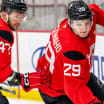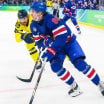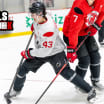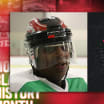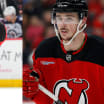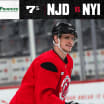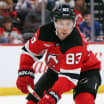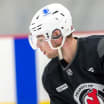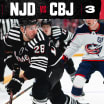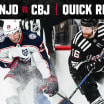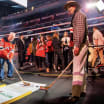The skeptics were far from convinced.
Most of the media covering the
1995 Stanley Cup Final
between Detroit and the Devils believed that New Jersey's victory in Game 1 at Joe Louis Arena was some kind of aberration.
"There wasn't a lot of respect for the Devils chances," recalled Mike (Doc) Emrick who was broadcasting the tourney for the Fox network. "Everyone figured that the Red Wings would rebound in the second game."
So did the faithful in Hockeytown USA who jammed Joe Louis Arena. They were encouraged as the home club took the offensive in the first period.
A Devils penalty opened the gates for Detroit's fearsome power play, and it immediately and intensively sought the first goal.
Emrick: "The expectation now was that Scotty Bowman's bunch would blow right past New Jersey."
Can They Beat Detroit Again? | SUNDAYS WITH STAN
After a surprising triumph in Game 1 of the '95 Stanley Cup Final for New Jersey, the question was could they have repeat success in Game 2?
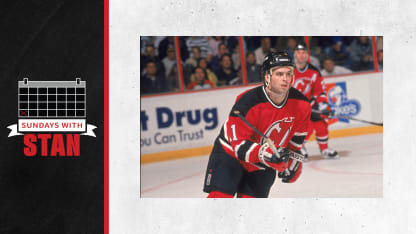
sundays with stan
1995 Stanley Cup Final: Devils vs. Red Wings
The Decisive Game 1
Previewing the 1995 Final
The Nervous Hours Leading to Game 1
And so it did look that way when slick Russian forward Slava Kozlov beat
Martin Brodeur
at 7:17. It was 1-0 Red Wings and that seemed more like it to those in the press row.
But the Devils shrugged off any feelings of inferiority. Before the Motor City skaters could follow up with a second goal, the Devils took over and the club's clutch-king, John MacLean illuminated the goal light and - Poof! - just like that, the game was tied 1-1.
By this time the Red Wings perceived that their challengers had one element that could change forecasts of the series. It was muscle.
"Well they had the 'fourth' unit," Emrick asserted, "the Crash Line. Between the likes of Mike Peluso, Bobby Holik and Randy Mckay there was a lot of good hitting."
Plus, coach Jacques Lemaire also owned an added asset, the best bodychecker in the business,
Scott Stevens
.
"He was a huge presence inside his blue line," noted hockey historian Andrew Podnieks in his book, Players. "His ability to hit with intimidating violence is what always gave him an edge.
"Players cutting over his blue line with their head down got punished with clean, open ice checks. They don't make them like Stevens anymore."
The offensive-minded Kozlov was just such a victim. Stevens lined him up like a submarine commander getting an innocent tanker it his crosshairs. And, then: "Fire torpedo!"
Kozlov was shattered as he never had been before or since; and the reverberations were felt all the way from the Red Wings bench to the last row of the cheap seats.
As the demolished Kozlov was carried off the ice, several Red Wings made threatening gestures at Stevens. With that, Scotty stopped, eyeballed the Detroit bench and pointed at the opposition.
His eyes glaring like searchlights, he warned, "You're next. You're next!"
"It was Scotty at his best," noted Devils radio analyst
Chico Resch
. "He hits and he hurts."
Not that the Detroiters quit on the spot; far from it. With more respect for their foe than before, the Red Wings stayed even with the Devils and two periods worth of intense hockey ended with the scoreboard recording a 1-1 tie.
All signs suggested that the next goal would be the winner and that certainly seemed like the case when Sergei Federov put the home club ahead early in the third period.
"One thing the Red Wings may not have realized," said Devils forward Bill Guerin, "is that we had a 21-year-old - Scotty Niedermayer - who could control any game he played. And he did in that third period."
Following a scramble behind the Devils net, Neider seized the puck, embarking on an end-to-end expedition that would alter the series.
"It was a moment I'll never forget," said Emrick, who singled Scott's rush as a true hockey prize.
By the time Niedermayer reached center ice he was out-skating every one of his pursuers. His former teammate Dave Andreychuk was awed by Scott's stride.
"Nieder's skating was effortless," noted Andreychuk. "I used to think that he could play a whole 60-minute game without breaking a sweat."
As he bisected the enemy defense, he released a shot that was slightly offer mark and appeared to defuse what looked like a serious Devils' threat.
But the puck sailed just to the right of the net, then rebounded - like a handball off the wall - directly out to the goal mouth. Nieder, who never put on the brakes, got to the puck before anyone and slipped it into the empty net. The game was tied; the fans stunned to the very core.
Emrick: "I was at the end of the rink, opposite from where Scotty scored. I was standing there with (ex-Devil) Peter McNab when the game still was up for grabs and he said, 'The Devils are gonna win The Stanley Cup - and it might be a sweep."
McNab's was a brash comment to be sure since the game was merely tied, 2-2. But the Devils were coming on and coming on strong, powered by one of Lou Lamoriello's late season acquisitions, defenseman Shawn Chambers.
"When I had the opportunity inside the other team's zone," Chambers explained, "I liked to shoot the puck."
That kind of opportunity arose as the third period was nearing an end. Working the left point, Chambers seized his moment, releasing his laser but it never reached the goal.
Detroit defenseman Paul Coffey stretched out and blocked the drive. But while doing so, Coffey's leg froze and he was unable to get on his skates. Meanwhile play continued while Coffey stayed horizontal.
"Next thing I knew," added Chambers, "the puck came back to me and I shot again."
It was another viciously hard drive but goalie Mike Vernon made the save. However, he was unable to contain the rebound. Camped in an ideal spot, just to the left of the crease, Brick, New Jersey native Jim Dowd, nested the puck behind Vernon.
The Devils now were ahead and a hometown boy had become the hero. "I was just happy to be on the ice," said Dowd, "happy they had enough faith in me to be out there."
New Jersey was ahead to stay, but, just to be sure, Stephane Richer added an empty-netter.
Emrick: "After that second game, the Red Wings were saying, 'Boys, we're in trouble.' The Devils won two games in Detroit and they were going home with the chance of executing the sweep."
Writing in Battle On The Hudson, author Tim Sullivan put it another way: "The Niedermayer-Dowd parlay crushed the Red Wings. In a span of 72 hours, they had lost as many games in one series as they had in the previous three combined."
Sure, New Jersey was up two games to none, but these were the Red Wings; any thought of being swept out of the tourney was not on their minds.
At least not yet.

